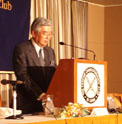Tokyo Market As an International Financial Center: Head of Tokyo Stock Exchange
Takahiro MIYAO (Professor and Head, Japanese Institute of Global Communications, IUJ)
| FCCJ Professional Luncheon:
|
| Date/Time: | December 13, 2007 (Th) 12:30 - 13:45 |
| Place: | Foreign Correspondents' Club of Japan |
| Program: |
12:30 - 13:00
Speaker: Atsushi Saito (President & CEO, Tokyo Stock Exchange Group, Inc.)
13:00 - 13:45
Q&A:
|
| Organizer: | Foreign Correspondents' Club of Japan (http://www.fccj.or.jp) |
 Mr. Atsushi Saito, president and CEO of Tokyo Stock Exchange Group, Inc., appeared in front of foreign (and some Japanese) correspondents and talked about how to improve the international position of the Tokyo market at the Foreign Correspondents' Club of Japan on Thursday, December 13. Mr. Saito is the former head of the Industrial Revitalization Corporation of Japan and one time Nomura Securities vice president. His speech, delivered in English, may be summarized as follows. Mr. Atsushi Saito, president and CEO of Tokyo Stock Exchange Group, Inc., appeared in front of foreign (and some Japanese) correspondents and talked about how to improve the international position of the Tokyo market at the Foreign Correspondents' Club of Japan on Thursday, December 13. Mr. Saito is the former head of the Industrial Revitalization Corporation of Japan and one time Nomura Securities vice president. His speech, delivered in English, may be summarized as follows.
The Tokyo stock exchange market is facing difficult challenges, as the speed of globalization is accelerating in financial industries and competition among the major exchanges are becoming fiercer. Countries all around the world are competing with each other to become an international financial center, and many countries are emphasizing market improvements as their vital policy issue. In fact, New York is now focusing on how to increase its competitiveness rather than strengthening corporate governance, while the EU is trying to improve efficiency for investors through competition among different markets.
Then, what should be done for Tokyo in order to establish its position as an international financial market? Currently a series of discussions are taking place at the government level (specifically at the Financial System Council and the Financial Services Agency) to help improve the efficiency of Japan's financial and capital markets. Among the issues under discussion are how to provide satisfactory financial products in the market and how to encourage transactions by professional investors. It is necessary for Japan to adopt a national policy for financial services, as traditional industries such as manufacturing are moving to developing economies and international competition is becoming fiercer with such established exchanges as New York and London as well as rapidly growing markets in China and Singapore.
In addition to the government's effort, the Tokyo Stock Exchange itself needs a clear picture for the future as an infrastructure element for Japan's financial industry. In fact, next few years seem vital for Tokyo to maintain its competitiveness, and for that purpose the following projects are to be introduced: (1) development of a next-generation trading system (to be launched in 2009), (2) improvement in confidence and transparency in the market by enhancing self-regulatory functions (currently under way), (3) expansion in product lineups by attracting more Asian and other foreign companies and creating a new market, jointly with the London Stock Exchange, targeting emerging companies at home and abroad (to start next year), and also by introducing other instruments such as ETFs and derivatives, and (4) establishment of alliances with other exchanges abroad such as New York, Euronext and Asian markets, especially in the areas of technology, networks, product development, promotion, etc.
It is very important for the Tokyo Stock Exchange to steadily implement all these measures in order to meet global market competition and enhance the position of Japan's capital market in the world. This, coupled with an enormous amount of financial assets in Japan, should contribute to a more efficient allocation of risk money throughout the Asian region and other parts of the world.
After Mr. Saito's speech, there were intensive discussions in which quite a few foreign correspondents asked him about the negative effects of Japanese business practices such as cross share holdings and "poison pills" on the international reputation of the Tokyo market. In response to those questions, beyond an official answer that the Tokyo Stock Exchange would not support or recommend such practices, Mr Saito's stance was not very clear as he emphasized the universal nature of those practices on one hand, while concluding on the other hand that Japan still maintains its unique culture in society and management, which might not change too easily.
Acknowledgment:
This review is adopted from the following blog (with its Japanese translation):
http://glocom.blog59.fc2.com/blog-date-20071213.html
|





